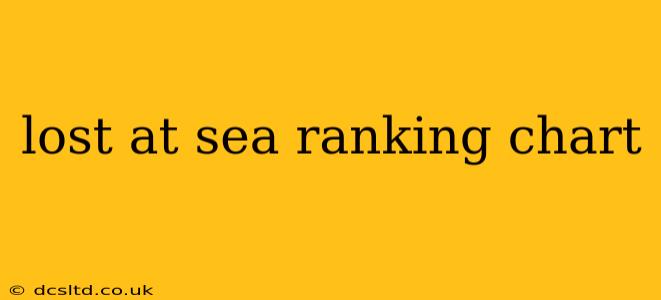Being lost at sea is a terrifying prospect, and survival depends on a complex interplay of factors. While no single ranking chart can perfectly encapsulate the unpredictable nature of maritime survival, we can analyze key elements crucial for increasing your chances. This article will explore the most critical factors affecting survival, addressing common questions and providing insightful analysis to help you understand the challenges and potential solutions.
What are the most important factors for surviving being lost at sea?
This is the central question, and the answer is multifaceted. The most crucial factors can be broadly categorized as:
-
Preparation: This is arguably the most critical factor. Proper planning before even setting sail vastly increases your survival odds. This includes possessing appropriate safety equipment, having a well-defined emergency plan, and ensuring your vessel is seaworthy.
-
Environmental Conditions: The weather, water temperature, and presence of currents or hazards significantly impact survival. A calm, warm sea offers far better prospects than a raging storm in freezing waters.
-
Physical and Mental State: Your health, fitness level, and mental fortitude play a crucial role. Stress management, resilience, and the ability to remain calm and rational are essential.
-
Resource Management: Effectively utilizing available resources (water, food, shelter) is vital. This requires knowledge of survival techniques and resource conservation strategies.
-
Rescue Efforts: The timely initiation and effectiveness of search and rescue operations are paramount. Having a functioning EPIRB (Emergency Position Indicating Radio Beacon) and a clear understanding of distress signaling techniques are life-saving.
It's impossible to assign a precise numerical ranking to these factors, as their relative importance shifts dramatically based on the specific circumstances. A perfectly prepared sailor in calm waters will have a far different experience than an unprepared individual caught in a hurricane.
What is the most important thing to have if you are lost at sea?
While many items are vital, a functioning EPIRB takes precedence. It directly triggers a search and rescue operation, dramatically increasing your chances of rescue. A good second choice would be a reliable VHF radio, allowing you to communicate distress calls directly to nearby vessels or coast guard stations.
What is the survival rate of being lost at sea?
The survival rate for those lost at sea varies tremendously, depending on factors already discussed. Unfortunately, precise statistics are difficult to obtain due to the unreported incidents, the vastness of the oceans, and the diverse nature of maritime accidents. However, the general consensus points to a significantly low survival rate without adequate preparation and rescue efforts.
How long can a person survive lost at sea?
Survival time depends heavily on factors like water temperature, access to fresh water and food, and the individual’s physical condition. In ideal conditions, survival for several weeks is possible. However, exposure to cold water, dehydration, and lack of sustenance drastically reduce survival time, potentially to just a few days.
How can I increase my chances of survival if I am lost at sea?
Preparation is key. This includes:
- Comprehensive safety equipment: EPIRB, VHF radio, life raft, flares, first-aid kit, sufficient water and rations.
- Seaworthiness of vessel: Regular maintenance, weather monitoring, and appropriate safety precautions.
- Survival training: Knowledge of signaling techniques, navigation, and basic survival skills.
- Emergency plan: A well-defined plan outlining actions to take in various scenarios.
Conclusion: Planning for the Unexpected
Being lost at sea is a serious threat, but preparedness can significantly increase survival chances. Understanding the key factors, investing in proper equipment, and acquiring essential survival skills are crucial steps towards mitigating the risks associated with maritime adventures. Remember, planning for the unexpected is the best way to ensure your safety on the open water.
